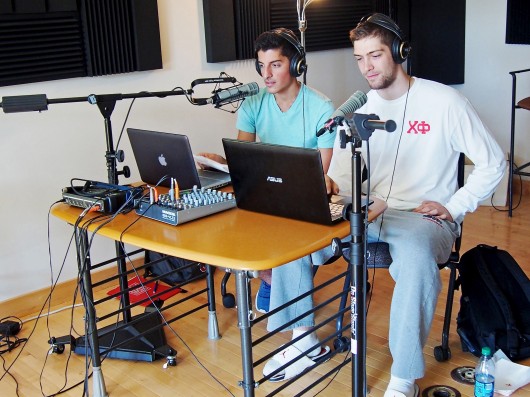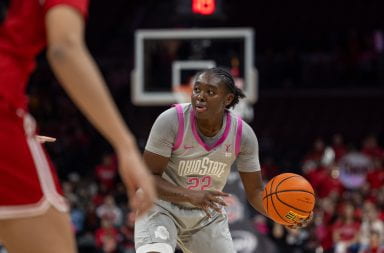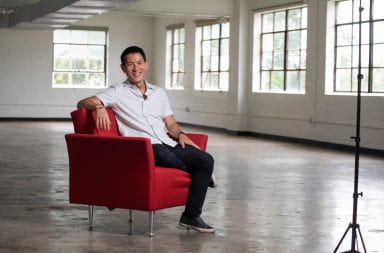
CLLC Radio DJs Sid Fragoulis (left), a second-year in exploration, and Nick Galouzis, a fourth-year in modern greek, conduct their first live broadcast of the semester to listeners.
Credit: Courtesy of CLLC Radio
Students looking to have their voices heard on a global stage might get the opportunity, with help from a broadcast radio-based course at Ohio State.
CLLC Radio is offered by the Ohio State Center for Languages, Literatures and Cultures, and gives students the opportunity to be radio DJs for select foreign languages.
It started as an independent study in 2006, then called OSU Underground Radio. Ten students participated when it began as an independent study, said Rebecca Bias, an instructor of the course and assistant director of the CLLC.
It is now a 3000-level course offered every Fall Semester for credit to students with a major or minor in one of the offered languages, which include Portuguese, French, Yiddish, Modern Greek and Spanish and Italian, Bias said.
Students in the course work independently to develop scripts with music, interviews and cultural information. They are able to DJ three live broadcasts throughout the semester, Bias said.
Sid Fragoulis, a second-year in exploration, said he receives texts from family and friends in Greece who have listened to his broadcast.
“Sometimes it’s hard being here and remembering the language. This class has helped me keep up to date with information and stay fluent with the language,” said Fragoulis, who is Greek
The course is included in student fees and requires no additional costs. A station for broadcasting is provided in Hagerty Hall and students are also able to use their own equipment, Bias said.
“It’s an opportunity for our best students to do advanced work on an individualized basis and they get experience writing out a script, speaking fluently, and interviewing native speakers here or abroad,” said Modern Greek CLLC Radio professor Christopher Brown.
Students are able to interview individuals and broadcast their shows abroad as well, Bias said.
Fourth-year in Modern Greek Nick Galouzis agreed. He said he took the course initially to build his speaking and writing skills and recommends it to others wanting to build confidence in the language.
The broadcasts can be listened to live from the CLLC website.
Students’ final broadcast of the semester is conducted live from Hagerty Hall and can be watched in person as well.
“It’s good for students in the lower levels of the language classes to hear a radio program spoken by a non-native speaker. Sometimes it can be hard to really understand what is being said, but it’s much easier for them to understand a program like ours,” said Madison Boyer, a fourth-year in French and linguistics.
The advanced course is offered to students who have typically been in the language at OSU for at least two years, Bias said, and languages not currently offered are considered for the course as well if interest and proper instructors to aid students exist. So far, she said there has been interest in including Japanese next year.


